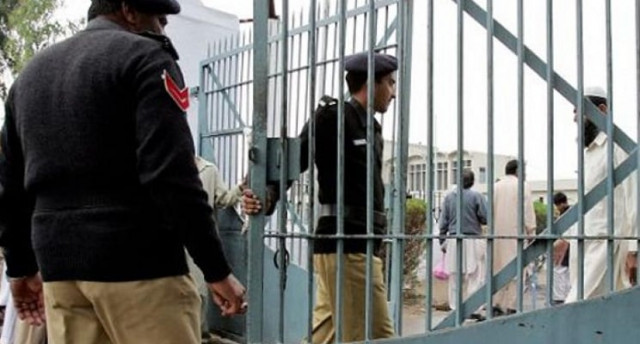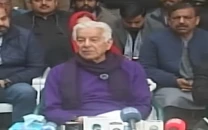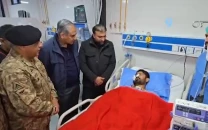K-P’s prisons a breeding ground for diseases
Jails across the province have a severe dearth of medical facilities

When Nafasat Khan, a death row prisoner at the Haripur Central Jail, developed an eye infection, he was driven to a nearby hospital for a checkup but when the doctor told him that he required surgery and would need to pay a hefty sum for it, Khan had no option but to learn to live with the infection.
Khan’s predicament is a common one in Khyber Pakhtunkhwa (K-P). Kamal, who is accused of attempted murder and is currently behind bars at the Peshawar Central Jail, recently suffered the same plight as his counterpart locked up in Haripur. Due to the dearth of medical facilities in prison, he was taken to the Lady Reading Hospital in the provincial capital, for an abdominal injury, where his family spent Rs 47,000 on various medicines and medical tests. However, they could not afford to continue spending huge sums on his health, so Kamal too had to learn to live with his abdominal injury.
Documents obtained by The Express Tribune from the provincial prisons department highlight that Khan and Kamal are not the only unlucky prisoners who are suffering due to the poor state of prisons in K-P, where the health of prisoners is not taken seriously. 196 incarcerated individuals in various jails across the province are suffering from diseases like tuberculosis (TB), Hepatitis B and C, and acquired immunodeficiency syndrome (AIDS) - 138 have Hepatitis C, 29 have Hepatitis B, 25 have AIDS, and 4 are suffering from TB.
Read Inmate subjected to custodial torture at Haripur jail: family
A majority of the sick prisoners are behind bars in Peshawar Central Jail, 13 are in sub-jail Swabi, 12 in sub-jail Charsadda, 12 in district jail Lakki Marwat, 9 in Bannu Central Jail, and 4 in sub-jail Malakand. Common amongst all the jails, apart from them housing ailing prisoners, is the fact that there is a severe dearth of medical facilities.
“The lack of medical facilities is not only the violation of K-P’s Prison Rules of 2018 but also a gross violation of the prisoners’ fundamental rights,” remarked Amanullah Pirzada, a lawyer, who works for the rights of incarcerated individuals.
“Rule 18 of the prison rules, clearly instructs that medical screening is mandatory for every prisoner within 24 hours of them being brought to jail; and if any prisoner is suffering from a communicable disease, that prisoner will be confined in a separate cell,” informed Pirzada, further adding that there were also rules which prohibited overcrowding of prisons but unfortunately all of these rules were being flouted.
Pirzada’s information holds weight as numbers obtained from the provincial prisons department show that the province has a total total capacity of housing 13,076 prisoners; however, there are currently 14,321 prisoners in jails across K-P.
Also read Congo fever detected in Quetta’s hospital staff
When asked why prison rules regarding prisoner health and overcrowded jails are flouted, Ahsanullah Jan, another lawyer, opined that everyone in the country assumes that those who are detained or incarcerated have no rights. “However, contrary to popular belief, prisoners do have rights. Article 10 of the International Covenant on Civil and Political Rights, which Pakistan has ratified, clearly states that prisoners should be treated with dignity and respect. Similarly, Articles 30, 31, and 32 of the Geneva Convention emphasise that the health of prisoners must be ensured at all times,” explained Jan.
“It is true that our jails are home to more than 14,000 prisoners when the total capacity is around 11,000. Overcrowding is part of the reason why diseases like TB, Hepatitis, and AIDS are spreading in jails of the province. However, we do not have the funds to establish proper healthcare facilities inside the prisons,” the former minister Hidayatullah said.
Published in The Express Tribune, November 5th, 2023.



















COMMENTS
Comments are moderated and generally will be posted if they are on-topic and not abusive.
For more information, please see our Comments FAQ